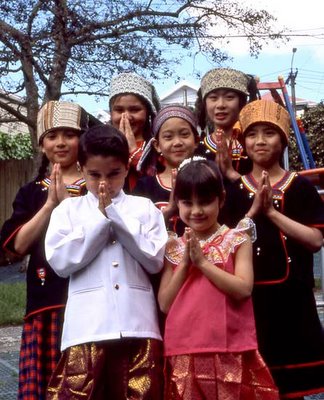
Most Americans are familiar with Jeff Foxworthy's redneck jokes. They poke good-natured fun at country people in the USA. Example: "You know you're a redneck if that billboard that says "Say 'no' to crack" reminds you to pull up your jeans." Rural people seem to enjoy them the most, because they can laugh at themselves.
Well, redneck jokes have now hit the Thailand expat community. Some guys blend in so well with the upcountry rural culture (especially guys who marry Thai wives from rural areas) that other expats are making fun of them. To quote one of my internet friends, "This is all for fun and should not be taken seriously. I love Thailand and the Thai people. This is just another way to express my love for their culture. " So here goes....
You know you're a Thai redneck if...
...If your idea of vehicle air bag safety is having your lady sit on the front of your motorbike.
....if your food tastes better when you eat on the floor sitting on newspapers
...if you consider owning a buffalo as a good investment
...if you don't use toilet paper [JD's note: that's only for fancy Bangkok people]
...if the one and ONLY bottle of medicine you have at home cures every single illness known to man.
...if your whole family sits on the floor eating your meal--when visiting a KFC or MacDonald's in Bangkok.
...if you use two 1-baht coins as tweezers.
...if you can't sleep because that chicken in the next room just won't shut up.
...if you carefully avoid the dog sleeping in the middle of the street but prefer hit-and-run for humans.
...if your idea of lawn ornaments are the empty plastic bags blown off the highway.
...if you haven't done the dishes in hot water for the last five years.
...if you can eat any dish consisting of 50% hot chili peppers without heart failure.
...if your idea of a traffic jam is two motorbikes waiting for the buffalo to finish his business in the middle of the dirt road.
...if your only morning alarm clock is the regular 4:30am mosquito attack.
...if you prefer the "Burning Garbage" aroma as your choice of spray can air freshener.
...if the back end and the front end of your pickup truck are held together by scrap wood.
...if your idea of "dining out" is moving from the inside floor to a grass mat outside the front door.
...if you use para* as cologne.
*(para: very popular condiment made from fermented fish and condensed into a paste. Quite a stimulant to the olfactory senses!)
At the least these should give you a tongue-in-cheek flavor for upcountry life!
______________________________________
[Acknowledgement: adapted from Thaivisa.com forum]
 (To my Thai friends: Some people who live out in the country in the USA live in small metal homes on wheels. When they are this small, we call it a "travel trailer." Its purpose is for travel, but some people live in them as a permanent home.)
(To my Thai friends: Some people who live out in the country in the USA live in small metal homes on wheels. When they are this small, we call it a "travel trailer." Its purpose is for travel, but some people live in them as a permanent home.)
And in closing, from America again...
 (To my Thai friends: Some people who live out in the country in the USA live in small metal homes on wheels. When they are this small, we call it a "travel trailer." Its purpose is for travel, but some people live in them as a permanent home.)
(To my Thai friends: Some people who live out in the country in the USA live in small metal homes on wheels. When they are this small, we call it a "travel trailer." Its purpose is for travel, but some people live in them as a permanent home.)






